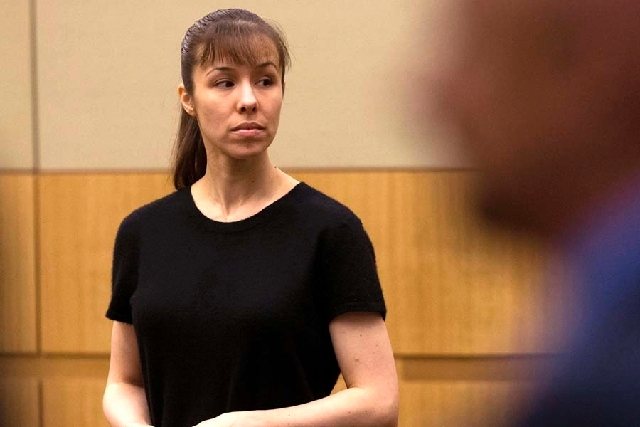Judge declares mistrial in penalty phase of Jodi Arias trial after jurors deadlock
PHOENIX — The judge in the Jodi Arias murder trial declared a mistrial in the penalty phase Thursday after the jury reported for a second time that it was deadlocked on whether to sentence her to life in prison or death for killing her boyfriend in 2008.
The judge scheduled a retrial for July 18. A new panel likely will be seated to try again to reach a decision on a sentence — unless the prosecutor takes death off the table agrees to a life sentence.
The panel began deliberating Tuesday and first reported they had failed agree the next day. The judge instructed them to keep trying.
The same panel on May 8 found Arias guilty of first-degree murder in the death of Travis Alexander, who was stabbed and slashed nearly 30 times and nearly decapitated at his Mesa home. The jury later determined the killing was cruel enough to merit consideration of the death penalty.
Under Arizona law, a hung jury in the death penalty phase of a trial requires a new jury to be seated to decide the punishment. If the second jury cannot reach a unanimous decision, the judge would then sentence Arias to spend her entire life in prison or be eligible for release after 25 years. The judge cannot sentence Arias to death.
Former Maricopa County Attorney Rick Romley has said the case could drag on for several more months as the new jury reviews evidence and hears opening statements, closing arguments and witness testimony in a “Cliffs Notes” version of the trial.
However, if the prosecutor decides not to pursue the death penalty a second time, the judge would then sentence Arias to one of the life in prison options, and the trial would come to a conclusion.
The verdict came two days after Arias spoke directly to jurors and pleaded for her life. She said she “lacked perspective” when she told a local reporter after her conviction that she preferred execution to spending the rest of her days in jail. She displayed family pictures for the jurors and told them she could bring about positive change in prison by teaching inmates how to read and helping launch prison recycling programs.
That night, Arias gave a series of media interviews from jail, telling reporters out about her many fights with her legal team and her belief that she “deserves a second chance at freedom someday.”
Arias, 32, contends she killed Alexander in self-defense when he became enraged after a day of sex, forcing her to fight for her life. Prosecutors say she attacked him in a jealous rage because he wanted to end their relationship and go to Mexico with another woman.
Her case became a sensation from the beginning as Arias gave a series of jailhouse interviews following her 2008 arrest in which she blamed the killing on armed, masked intruders.
She went on trial in January, and the case provided endless amounts of cable TV and tabloid fodder, including a recorded phone sex call between Arias and the victim, nude photos, bloody crime-scene pictures and a defendant who described her life story in intimate detail over 18 days on the witness stand.
The former waitress told jurors of an abusive childhood, cheating boyfriends, dead-end jobs, her sexual relationship with Alexander, and her contention that he had grown physically violent.
The trial was streamed live on the Internet and became a real-life soap opera to people around the globe. Some even traveled to Phoenix to attend the trial and became fans of the fiery prosecutor, Juan Martinez, who repeatedly tangled with Arias during her testimony. They sought his autograph outside court and had pictures taken with him, prompting the defense to argue for a mistrial. Their request was denied.
The verdict brings a close to the trial’s penalty phase, which featured dramatic statements by Alexander’s sister and brother as they described how their lives were shattered by the loss of their beloved sibling.






















